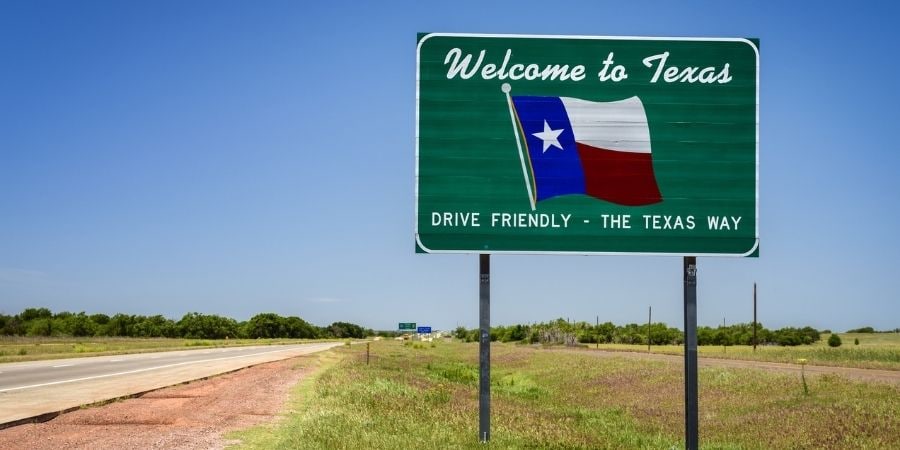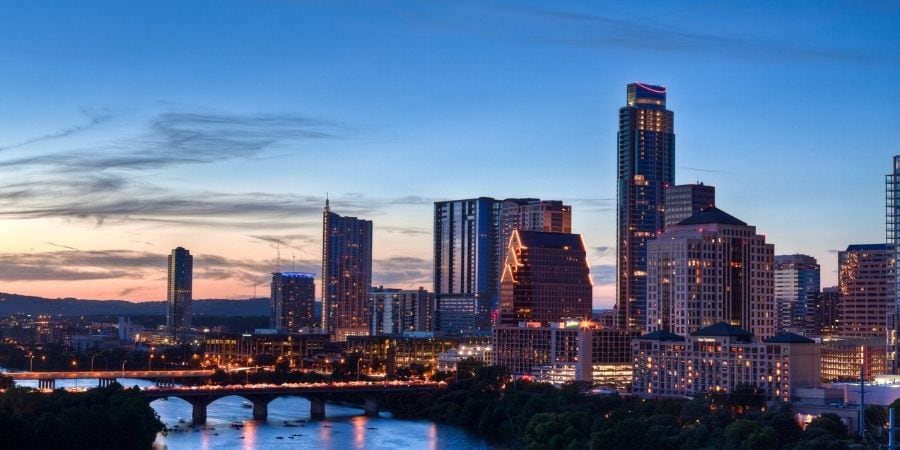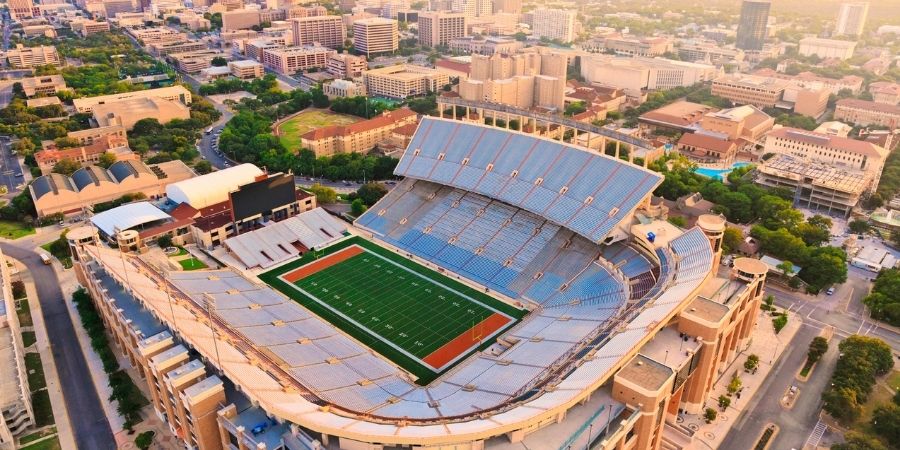The population in Texas is now about 29.1 million [1]. 2019 was the seventh year in a row that Texas welcomed over half a million new residents to the state, which just goes to show you how popular moving to Texas has become over the years [2].
So why are people moving to Texas? We’ve compiled ADT’s top ten reasons you might join the millions of other people who call Texas home.
Ten reasons to move to Texas
1. You won’t pay state income taxes.
Texas is one of several other states that don't require someone to pay state income tax, potentially saving you hundreds or thousands a year. Instead, it requires higher sales taxes controlled by the local government and higher property taxes.
2. Texas has affordable housing.
The average cost of owning a home in 2019 was $172,500, while rentals were $1,045, both below the national average [3]. According to Texas Realtors, homes in Texas cost around $310,000, but you can still find very affordable options throughout the state [2].
3. If you like warm weather, Texas has plenty of it.
Even winters tend to be mild in many parts of the Lone Star State. Warm temperatures in the summer often continue well into October, rarely exceeding 50-degrees outside of The Panhandle.
4. The strong job market.
Many large metro cities in Texas have unemployment rates lower than the national 4.2% average, including Austin-Round Rock (3.2%), Dallas-Fort Worth-Arlington (3.9%) and San Antonio-New Braunfels (4.1%) [4].
5. There’s an eclectic and delicious food and drink culture.
If it's one thing that comes to mind about the Lone Star State, it's got to be their world-famous barbecue. Texas is also home to incredible chili (the state Texas dish) and, of course, Tex-Mex.
Next time you're in Austin, try Franklin Barbecue for a classic taste of Texa barbecue. Christie's Seafood & Steaks is a Hoston institution, serving food for over 100 years. Or try your hand at The Big Texan Steak Ranch's 72-oz. Steak Challenge in Amarillo. The Blue Bonnet Cafe in Marble Falls serves up all-day breakfast. Torchy's Tacos represent the perfect example of Tex-Mex fare all over Texas since you can find them in over 80 locations over seven states.
6. Many fantastic sports teams call Texas home.
You can find a sports bar playing the latest game, with plenty of other fans cheering their favorite team on. There is a serious sports culture in many cities, with popular football, basketball, baseball and even hockey teams enjoyed throughout the state and beyond.
Consider the Dallas Cowboys, winners of five Super Bowls and popularly referred to as America's Team for their wide-reaching fanbase. The Houston Texans are also a fan-favorite team.
If you’re more of a basketball fan, Texas is home to the Dallas Mavericks, Houston Rockets and San Antonio Spurs, all with various championships under their belts, too.
The Houston Astros and Texas Rangers are two of Texas' most popular MLB baseball teams. MiLB is also popular and includes the El Paso Chihuahuas, Round Rock Express and Sugar Land Skeeters, among other beloved teams.
7. Lower cost of living.
Texas’ lower cost of living means that your dollar stretches more. The state is ranked for low average gas prices, lower grocery costs and overall cost of living.
8. Higher education opportunities abound.
Texas has many well-rated universities like Rice University and Texas A&M University, consistently ranked in many top college lists.
9. Many different indoor and outdoor activities.
Because of the warm weather, the state is popular for many year-round activities, including hiking and biking. Many festivals and conventions call Texas home, such as Austin City Limits, South by Southwest (SXSW), Kerrville Folk Festival, and Anime Matsuri.
10. Texas has a high diversity ranking.
WalletHub rates it as the second most diverse state in America, using socioeconomic, cultural, economic, household, religious and political diversity in their ranking system.
With an affordable cost of living, no income tax and plenty of cultural and recreational activities to do, it’s no wonder why so many people are moving to Texas.


What is the best city in Texas?
Everyone has a different opinion on what makes a place the best for them. Are you focused on nightlife or culture, or affordability and education? Whether you're looking for a safe place for your family or world-class college education, there's a city in Texas for you.
We’ve compiled a list of stats about Texas to help you make your decision on where to move, exploring the reasons why Texas is so loved and giving you a glimpse into the safest and most dangerous Texas cities.
Key Texas Stats:
Population: 29,527,941*
Annual Median Household Salary: $61,879**
Average Monthly Rent: $1,045**
Median Value of Owned Homes: $172,500**
Average Travel Time to Work: 26.6 minutes
*Population estimates, July 1, 2021.
**2015-2019
[Source: United States Census Bureau]
Texas Best of Lists:
Three Texas cities ranked in Money Magazine’s list of Top 50 Best Places to Live in the U.S.: Flower Mound, Frisco and Round Rock.
Austin is rated #5 on U.S. News’ Best Places to Live in the U.S., with Dallas-Fort Worth (#37) and Houston (#39) also ranking in the top 50.
Austin is #1 on U.S. News’ fastest-growing cities list.
AARP lists Fort Worth on its Best Places to Live and Retire Now list.
Listed in Niche’s people-driven reviews for Best Cities to Buy a House in America, with The Woodlands at #2, Plano at #4, Richardson at #7, Round Rock at #14, Wichita Falls at #16 and Abilene at #18.
The #2 Best State for Business according to Forbes, falling from their #1 spot in 2020.
Rice University in Houston, Texas, is on the top 25 of Forbes' list of Best Colleges with A&M in the #50 slot. Rice University is listed as U.S. News' 17th choice and A&M their choice for Best National Colleges.
#1 Best Place to Start a Business and #2 most Diverse State according to WalletHub.


Texas crime statistics
The overall crime rate in Texas was 2,666.7 per 100,000 residents, a 4% decrease from the previous year.
Property crime was significantly higher than violet crime, ranking 2223.9 per 100,000 people, with over 600,000 property crimes reported. Property crimes in this statistic included burglary, larceny-theft and motor vehicle theft.
Here are a few more statistics about crime in Texas.
More crimes were reported in October and January than in any other month [5].
Larceny-theft accounted for 70.7% of all property crimes [5].
The property crime rate decreased almost 6% from 2020 to 2019 [5].
$2,308,803,441 is the estimated amount of reported stolen property, down 20% from the previous year [5].
What are the safest cities in Texas?
In 2020, the state of Texas had a total crime rate of 2,666.7 per 100,000 residents [5]. This number is down 4% since 2019 and is in line with a lower crime rate over the past 10 years [5].
While the FBI and Census Bureau are great for keeping tabs on yearly statistics, we’d also recommend checking out a local crime map for more up-to-date information.
Top 10 safest and most dangerous Texas cities:
According to the Crime in Texas 2020 Report, Humble has the highest overall crime rate while Colleyville has the lowest reported crime [5].
Highest overall crime rates³ in Texas cities per 100,000 people.
Humble – 11,573.93
Bellmead – 6,831.83
Lubbock – 5,614.41
Donna – 5,539.93
Houston – 5,391.69
Alamo – 5,376.07
Harlingen – 5,230.52
San Antonio – 5,032.69
Texarkana – 4,999.18
La Marque – 4,956.66
Lowest overall crime rates³ in Texas cities per 100,000 people in 2020.
Colleyville² - 632.75
Fair Oaks Ranch² - 334.9
Fate – 513.7
Fulshear – 622.89
Horizon City – 536.48
Marshall³ - 525.26
Memorial Villages – 665.49
Murphy – 543.8
Trophy Club – 498.8
Highland Village – 693.7
¹ Data includes the offenses of murder, rape (legacy definition), robbery, and aggravated assault.
² Data includes the offenses of burglary, larceny-theft, and motor vehicle theft.
³ Data includes the offenses of murder, rape, robbery, aggravated assault, burglary, larceny-theft, and motor vehicle theft.
This data was calculated by eliminating towns with less than 10,000 residents.


Is Texas an affordable place to buy a home?
Yes! You can actually afford to buy a home in Texas.
The median house price for a single-family home is between $217,500 to $310,000. Compared to New York at $313,700 or California at $505,000, it's no wonder people are moving to Texas [2, 3].
So what is the real estate market like in Texas? Austin-Round Rock is estimated to have an increase in home sales of 4.7%, while Dallas-Fort Worth and Arlington are estimated to increase by 8.3%.
| How much does it cost to buy a home in Florida? | ||
| County | Median Price | Percentage Difference YoY |
| Austin-Round Rock | $465,000 | +32.9% |
| Corpus Christi | $259,900 | +8.3% |
| Dallas-Fort Worth-Arlington | $354,900 | +18.3% |
| El Paso | $207,000 | +13.2% |
| Houston-The Woodlands-Sugar Land | $305,000 | +15% |
| Lubbock | $220,000 | +10.6% |
| Odessa | $225,000 | 0% |
| San Antonio-New Braunfels | $295,000 | +15.7% |
| Tyler | $267,250 | +13.7% |
| Victoria | $221,500 | +13.6% |
| Waco | $255,000 | +17.5% |
How much does it cost to live in Texas?
If you're looking to buy a home in Texas, you've got plenty of affordable options. And since Texas is so large, there are a lot of costs to factor into your moving decision.
Overall costs per month:
Electricity: $132.59
Natural Gas: $11.64 (per one thousand cubic feet, not to be confused with square feet)
Internet (50 Mbps; national average): $52.37
Cable: $217.42 (national average)
Basic streaming services (Netflix, Hulu, Amazon Prime, Disney+): $36.96
Water: $41.23
Waste/Sewage: $31.70
Garbage (Trash/Recycling): Varies from city to city, but here are a few examples: Arlington: $15.46, Dallas: $34.30, Waco: $16.10 and Austin: $22.65+


Moving to Texas
So you're ready to move to the Lone Star State! But is moving to Texas worth it? And when is a good time to move there? In this section, we'll go over those details.
So what are some things you should know before moving to Texas?
They take their food seriously, from barbecue to brisket. (And never, ever add beans to the chili!)
You’ve no doubt heard that “everything is bigger in Texas.” That stands true for anything from the State Capitol (taller than the U.S. Capitol), to their stadiums, churches and even their landmass size (second largest—behind Alaska).
Come prepared for any type of weather. There are several different climates, ranging from hot and dry in the west to hot and humid in the southeast. Even the middle of the state can often expect varying weather.
There’s plenty of nature to explore—both family-friendly hiking trails and plenty of experienced hikers, too.
Texans take pride in their sports teams. A LOT of pride.
Austin alone is home to over 40 breweries, making Texas a craft beer mecca.
Texans are known to be incredibly hospitable to others, and very warm and welcoming.
Seeing guns and gas side-by-side is a pretty common sight.
Cut-off jeans and boots are a common sight to see. Even wearing boots with formal wear, such as at weddings or graduations.
“Don’t mess with Texas” started as a slogan for an anti-littering campaign but has become a Texan motto.
Texas ranks at the top of the list for most tornadoes per year, at over 150.
You can keep your other fast-food chains like McDonald’s and Shake Shake. Whataburger reigns supreme in many Texas cities.
Like anywhere you're making your new home, it's important to get involved in your community and explore the culture of your new home. Texans will welcome you with open arms as long as you're open-minded and willing to embrace Texas culture!
When is a good time to move to Texas?
When moving to Texas, you should hire movers several months in advance. This will give you a better chance of getting a good deal and shopping for a company that best fits your needs. If you want to avoid the scorching temperatures of a Texas summer, fall is a good time to move.
How much savings do you need for your Texas move?
In most situations when you move, you'll need money for your security deposit, as well as the first month's rent. Since the average rent in Texas is $1,045, you're looking at at least $2,090 for your apartment or rental. On top of that, you'll need money for the moving company, which could range from $1,000-2,000 for a full-service moving company.
We’d recommend you have about $4,000-5,000 saved for your move, depending on how far and where you’re moving.
Texas has many things going for it, from its diversity to the low cost of living. If you choose to move to Texas, you'll find it a warm and welcoming environment.
If you want help protecting your new Texas home, ADT is here for you.
Frequently Asked Questions about Living in Texas:
Is Texas friendly?
Texas is a friendly state and has even won awards for being friendly. Many Texans are happy to greet a new neighbor and won't hesitate to invite you over for a tasty bite.
Why are Californians moving to Texas?
Californians are moving to Texas for its lower cost of living, larger homes and better employment opportunities.
Why are companies moving to Texas?
Texas consistently rates as the #1 state for business in America, mainly due to its low housing costs and tax rate and appealing business climate.
[1] https://www.census.gov/library/stories/state-by-state/texas-population-change-between-census-decade.html
[2] https://www.texasrealestate.com/market-research/quarterly-housing-report/
[3] https://www.census.gov/quickfacts/fact/table/TX,US/PST045221
[4] https://texaslmi.com/api/GetHomeLinks/TLMR
[5] https://www.dps.texas.gov/sites/default/files/documents/crimereports/20/2020cit.pdf
[6] https://ucr.fbi.gov/crime-in-the-u.s/2019/crime-in-the-u.s.-2019/topic-pages/violent-crime
Related Articles:


